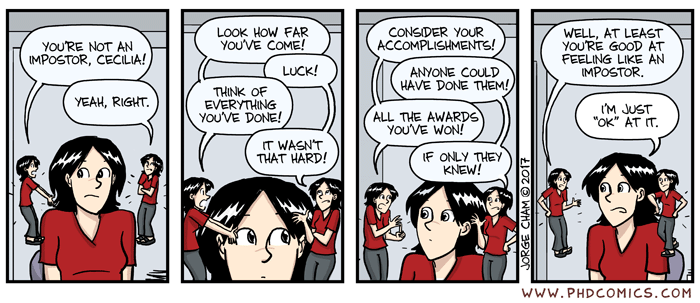Before I start this post, I would like to point out that I am speaking from personal experience only.
When I joined my PhD program, I was…happy. Delighted at having received this opportunity, with funding, for a project that I thought was completely awesome, in a city that I fell in love with within weeks, in a department I thought was quite supportive and under a supervisor I knew and had worked with already. When I joined my department, my colleagues, who eventually would form the core of my PhD support, were coming to the end of their first year. They had had their experiences and were openly annoyed at how happy I was. ‘Talk to us in a year’ they said. Sure enough, a year later I was seriously questioning my life, and trying very hard to not cry in front of my supervisor while telling him how something in the lab had collapsed, yet again.
Now, every PhD course is different. But the colleagues I’m talking about and I had something in common – all our first years were dedicated to setting up labs, experimental systems, designing huge (more than a single PhD) studies, and getting all this up and running. Now that we are all approaching the end of our PhDs, it is almost a fact that the time towards the end of our first years was the toughest point of the entire PhD. That point of the lowest low, before everything comes together and you can indeed run the experiments you’ve wanted to.
But is it all uphill from there? I hardly think so. I was ‘only’ having breakdowns the first one and a half year. One time in my third year, I had responded to a project my supervisor was discussing with me by saying ‘I don’t know if I can do research…maybe I shouldn’t be continuing this’. Thankfully he was shocked enough to ask me where this was coming from and kind enough to say he doesn’t agree with me and that I should give it a second thought. I have gotten better at evaluating my strengths and weaknesses since then, but this is also a learning curve.
I just finished my fourth year, and I still don’t consider my PhD as a routine job where I walk into work, do my job and leave. It comes with emotional turmoil, it comes with a steep 3-5-year long learning curve in various skills, supervising, teaching, being supervised, being taught, occasionally even whistleblowing, and finally being responsible for published work. The published work is probably the most significant point. There are very few careers where that start with legal attestations that the work produced is entirely original, error-free and trustworthy…not to mention, novel, brilliant and ground-breaking! And if you have fears already – about your performance, about public speaking, about presenting – be sure they will be intensified. With all this comes anxiety, depression and the great equaliser from PhDs to Professors – burnout!
It doesn’t end there though. Most PhDs are high achieving individuals who (surprise surprise) are also prone to imposter syndrome. Here’s a concise video explaining how imposter syndrome works. So, you may work day and night to reach your goals, and then think you don’t even deserve them!
Here’s a statistic from my life that I just calculated. Of all the PhDs I’ve known, within and outside my department, within and outside the country I work in, over 80%, including myself, have at some point considered counselling or professional mental health support of some sort. What does that say about academia? That the academic ladder is tough? That PhDs are just more likely to seek help? That people getting into research are ‘crazy’, and that’s why they should quit and get a regular job? That most research institutes and universities don’t have support systems in place? That high achieving people are more likely to have mental health issues? I don’t know…maybe all of it, maybe some of it, perhaps none of it.
But just like other psychological stressors, the PhD phase too can be made better by protective factors such as social support, hobbies, exercise; but if you need to walk into a counsellor’s office because of your PhD stress, know that you are not alone in doing so.
